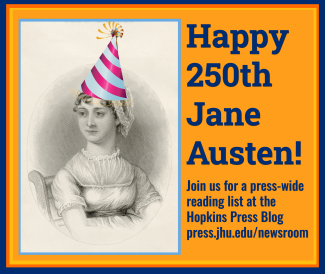Newsroom
Filter
Kelley Squazzo Appointed Director of Project MUSE
Johns Hopkins University Press has appointed Kelley Squazzo as the new Director of Project MUSE, effective immediately. With 25 years of experience in scholarly and educational publishing, Kelley brings a dynamic vision, deep industry expertise, and an...

Top 20 Articles of April 2025
Our April Top 20 most-read journal articles list features a lot of exciting new pieces, including Cass R. Sunstein's introduction to the "Liberalism Under Siege" special issue of Social Research; a new poem by Mark Doty in Spiritus; and a new article by...

On The Path of Gratitude: East German Climbers in North Korea’s Diamond Mountains
We typically think of East Germans as isolated and sequestered behind the Berlin Wall. There is certainly much truth to this belief. Until 1989, East Germans’ ability to travel was severely restricted by communist authorities. But it is not the whole truth...

The Undead Walk, but Zombie Bugs Crawl
Zombies aren't just the stuff of nightmares. Join Rise of the Zombie Bugs author Mindy Weisberger in a conversation on the evolutionary quirks of zombifying parasites.

Top 20 Articles of March 2025
The stats are in, and here's what you were reading most from Hopkins Press journals in March 2025 through Project MUSE. Featuring long-time favorites from Journal of Democracy, Hispania, World Politics and Perspectives in Biology and Medicine and newer entries...

A Trans Day of Visibility Reading List
In celebration of Trans Day of Visibility, held each year on March 31, we surveyed our recent books and journal articles by and about the trans community. From current events to romantic literature, we're showcasing a broad range of research that is...

Top 20 Articles of February 2025
February's access numbers have been tallied, and the top 20 Hopkins Press articles you and your colleagues read on Project MUSE can be revealed! Last month's breakout hit was Jacqueline Antonovich's "White Coats, White Hoods: The Medical Politics of the Ku...

The Four Steps of Assertiveness: Take Charge of Your Life
An engaging guide for cultivating assertiveness to live a happier life.

Celebrating: 43 Hopkins Press Journals Join S2O
In its quest to advance open access (OA), Project MUSE has announced that their Subscribe to Open (S2O) initiative reached its 2025 sustainability goal, providing public open access to the contents of more than 100 journals this year — including 43 journals...

The Conversation on Higher Ed: Navigating College’s Biggest Challenges
From TheConversation.com, a critical analysis of the tenuous future of higher education.

